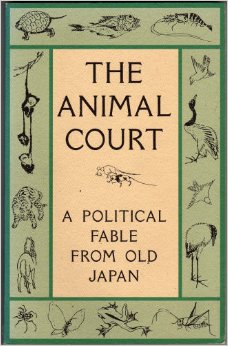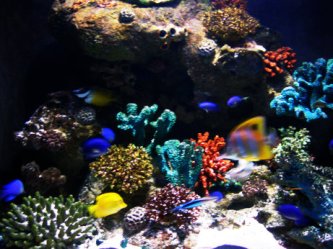
![]() I’ve been doing so preliminary research into Japanese approaches to animal and environmental ethics. In many respects this has been something of a frustrating exercise. However, along the way I’ve discovered The Animal Court by Ando Shoeki, which is proving a real pleasure to read (my copy is a translation by Jeffrey Hunter). Shoeki’s work, written in the 18th century, is a rather biting satire directed at Buddhism, Shintoism, and Confucianism. The book recounts various discussions held in each of the animal kingdoms (birds, beasts, crawling creatures, and fish), where the animals discuss how awful humans are. In one passage, he likens the Nichiren Buddhists to the Bird of Paradise, who says ‘I eat nothing but air, and do nothing but fart.’ Ouch.
I’ve been doing so preliminary research into Japanese approaches to animal and environmental ethics. In many respects this has been something of a frustrating exercise. However, along the way I’ve discovered The Animal Court by Ando Shoeki, which is proving a real pleasure to read (my copy is a translation by Jeffrey Hunter). Shoeki’s work, written in the 18th century, is a rather biting satire directed at Buddhism, Shintoism, and Confucianism. The book recounts various discussions held in each of the animal kingdoms (birds, beasts, crawling creatures, and fish), where the animals discuss how awful humans are. In one passage, he likens the Nichiren Buddhists to the Bird of Paradise, who says ‘I eat nothing but air, and do nothing but fart.’ Ouch.
Shoeki’s work is interesting for a political theorist and animal ethicist because, woven into the story, are interesting bits of normative moral philosophy (although his metaphysics is utterly bonkers). In the first chapter, he criticises the three religions above for depending upon exploitative labour relations and for exhibiting vices of greed, selfishness, and ignorance. And, he makes a claim, reminiscent of social contract theorists, that humans are born equal and thus no one possesses a natural right to rule: ‘among humankind there are no divisions into superior and inferior, noble and lowly, rich and poor.’ The three religions, he writes, have created social structures that have moved people away from their naturally virtuous selves, making them behave as animals and live in exploitative hierarchical structures. Here, I was reminded of Rousseau’s theory of human nature. Within the chapter are claims about the wrongness of inequality (because it brings suffering and exploitation), and about the badness of wars (with an implicit claim that those outside of national borders are worthy of moral concern). There’s even a notion of false consciousness sitting alongside the complaints about exploitation (only a century before Marx).
The chapter finishes by claiming that people who capture and keep millions of birds are evil. He writes: ‘What can they be thinking that they fail to understand how it would feel if they were put in the cage, if their wife and children were put in cages, and taken to be sold! No, they do not deserve to be regarded as human beings.’ In other words, to be human is to be able to empathise with non-human animals and treat them with respect and compassion.
Shoeki wasn’t exactly influential in Japanese ethical thought, which is a shame, but he provides a promising vein of thought to draw upon for contemporary theorising. I’m looking forward to reading the rest of the book..

 The other day a friend shared a link to a story on the importance or preserving biodiversity. I can’t find that link now, but what struck me at the time was that the value of biodiversity was simply assumed and undefended. This isn’t surprising of course, popular discourses around conservation and environmental protection continually repeat this message such that it’s hard not to just take it as read that biodiversity is important and should be preserved. But, why is biodiversity important and in what ways?
The other day a friend shared a link to a story on the importance or preserving biodiversity. I can’t find that link now, but what struck me at the time was that the value of biodiversity was simply assumed and undefended. This isn’t surprising of course, popular discourses around conservation and environmental protection continually repeat this message such that it’s hard not to just take it as read that biodiversity is important and should be preserved. But, why is biodiversity important and in what ways?